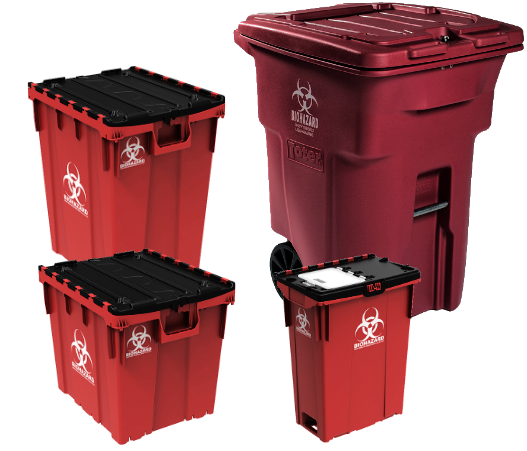Defending Well-Being: Unveiling the Essence of Expert Medical Waste Removal
Defending Well-Being: Unveiling the Essence of Expert Medical Waste Removal
Blog Article
Efficient and Eco-friendly Medical Waste Disposal Solutions
In the ever-evolving area of health care, the concern of medical waste disposal remains a topic of vital importance. As hospitals, centers, and various other healthcare facilities aim to offer top quality person treatment, they must also deal with the difficulty of efficiently and sensibly disposing of their waste.
Waste Partition Practices
Reliable waste segregation practices are necessary to guarantee the safe and proper disposal of medical waste. Clinical waste, that includes materials infected with possibly infectious compounds, should be handled in such a way that lessens the threat of harm to both public wellness and the atmosphere. Appropriate waste partition plays a crucial function in accomplishing this objective.
Waste segregation involves the splitting up of various kinds of waste based upon their qualities and potential dangers. This procedure ensures that each kind of waste is dealt with and disposed of properly (medical waste disposal services with WasteX). It starts at the factor of generation, where health care centers need to have designated bins and containers for various waste groups, such as sharps, contagious waste, pharmaceutical waste, and non-hazardous waste
By setting apart clinical waste at the source, health care companies can stop cross-contamination and decrease the danger of exposure to transmittable representatives. This practice additionally facilitates the recycling and healing of particular materials. Segregating and recycling tidy plastics and glass lowers the demand for raw materials and lessens the ecological effect of medical waste disposal.

Autoclaving and Sanitation Methods
In order to ensure the risk-free and appropriate disposal of medical waste adhering to efficient waste segregation techniques, health care centers need to employ autoclaving and sterilization strategies. Autoclaving is a widely used approach that utilizes high-pressure steam to disinfect medical waste.
Another typically utilized sanitation strategy is chemical sterilization. This includes dealing with the waste with chemicals such as ethylene oxide or hydrogen peroxide, which kill microbes by interrupting their mobile framework. Chemical sterilization is frequently used for heat-sensitive things or products that can not endure the high temperatures of autoclaving. It is vital to note that chemical sterilization needs correct handling and disposal of the chemicals used, as they can be hazardous to human health and the setting if not managed correctly.
On-Site Waste Treatment Equipments
Health care facilities have implemented on-site waste therapy systems to attend to the disposal of clinical waste in a effective and risk-free manner. These systems supply a hassle-free and affordable remedy for managing clinical waste produced within the facility. On-site waste therapy systems utilize different innovations to get rid of and deal with of medical waste on-site, reducing the need for transportation to off-site centers.
One generally used on-site waste treatment system is the microwave innovation. This innovation utilizes microwave power to decontaminate look these up and sterilize clinical waste, lowering its quantity and providing it secure for disposal. An additional system is the chemical sanitation technology, which involves treating clinical waste with chemicals to eliminate pathogens and lower its hazardous nature. This technique is specifically efficient for fluid clinical waste.
They eliminate the threat of medical waste being messed up during transportation, lowering the possibility for contamination and exposure to damaging substances. On-site therapy systems decrease the total ecological effect of medical waste by minimizing transport and the need for garbage dump room.
Recycling and Repurposing Initiatives
As healthcare facilities pursue sustainable waste management methods, they are increasingly exploring recycling and repurposing efforts as a way of decreasing the environmental effect of clinical waste. Recycling and repurposing efforts include discovering cutting-edge methods to reuse or transform clinical waste right into new products or materials. This not just aids to reduce the quantity of waste that finishes up in landfills or burners but additionally minimizes the consumption of raw products and power needed for manufacturing new products.
One example of recycling in the healthcare industry is the reprocessing of single-use medical devices. This not just minimizes the quantity of waste produced however likewise saves medical care facilities significant costs associated with acquiring brand-new devices.
Another recycling effort involves the recycling of plastic containers, such as medicine bottles or syringe housings. These containers can be accumulated, arranged, and sent to recycling centers where they are refined, melted down, and transformed right into brand-new plastic products. This aids to preserve resources and minimize the demand for virgin plastic manufacturing.
In addition to recycling, repurposing campaigns entail locating different usages for medical waste. Shredded paper waste from medical documents or product packaging materials can be repurposed as bed linen product for animals or as insulation product. Organic waste such as food scraps from healthcare facilities can be composted and utilized as fertilizer in yards or farming areas.

Renewable Resource Solutions
One effective strategy to mitigating the environmental impact of medical care operations involves executing renewable resource remedies. Healthcare centers, such as centers and health centers, consume substantial quantities of energy for various objectives, including lights, home heating, cooling, and operating clinical tools. By transitioning to renewable resource sources, these check here facilities can significantly minimize their carbon impact and add to an extra lasting future.

Applying renewable resource remedies in health care centers not only minimizes greenhouse gas emissions yet also offers lasting price financial savings. While the preliminary investment in renewable resource infrastructure might be higher, the long-term functional costs of renewable energy systems are substantially reduced compared to conventional fossil fuel-based power sources. Additionally, renewable resource systems are trusted and can offer a secure and nonstop power supply, ensuring continual medical care solutions even during power outages or emergencies.
Verdict
In final thought, applying reliable and eco-friendly medical garbage disposal services is necessary for keeping a lasting medical care system. By embracing waste segregation techniques, autoclaving and sterilization methods, on-site waste treatment systems, recycling and repurposing efforts, and sustainable power services, health care centers can considerably decrease their ecological impact. These steps not only protect the setting however likewise promote public wellness and security. Therefore, it is crucial for healthcare organizations to focus on the application of these sustainable waste disposal techniques.
It starts at the point of generation, where medical care centers ought to have assigned bins and containers for different waste groups, such as sharps, infectious waste, pharmaceutical waste, and non-hazardous waste.
In order to make sure the appropriate and risk-free disposal of clinical waste adhering to effective waste segregation methods, medical care centers must utilize autoclaving and sanitation techniques.Healthcare facilities have carried out on-site waste therapy systems to resolve the disposal of medical waste in a risk-free and effective fashion. On-site waste therapy systems utilize various innovations to get rid of and treat of medical waste on-site, minimizing the requirement for transport to off-site facilities.
As healthcare facilities strive for sustainable waste management practices, they are progressively checking out recycling and repurposing efforts as a way click for info of lowering the environmental effect of medical waste. - medical waste removal service
Report this page